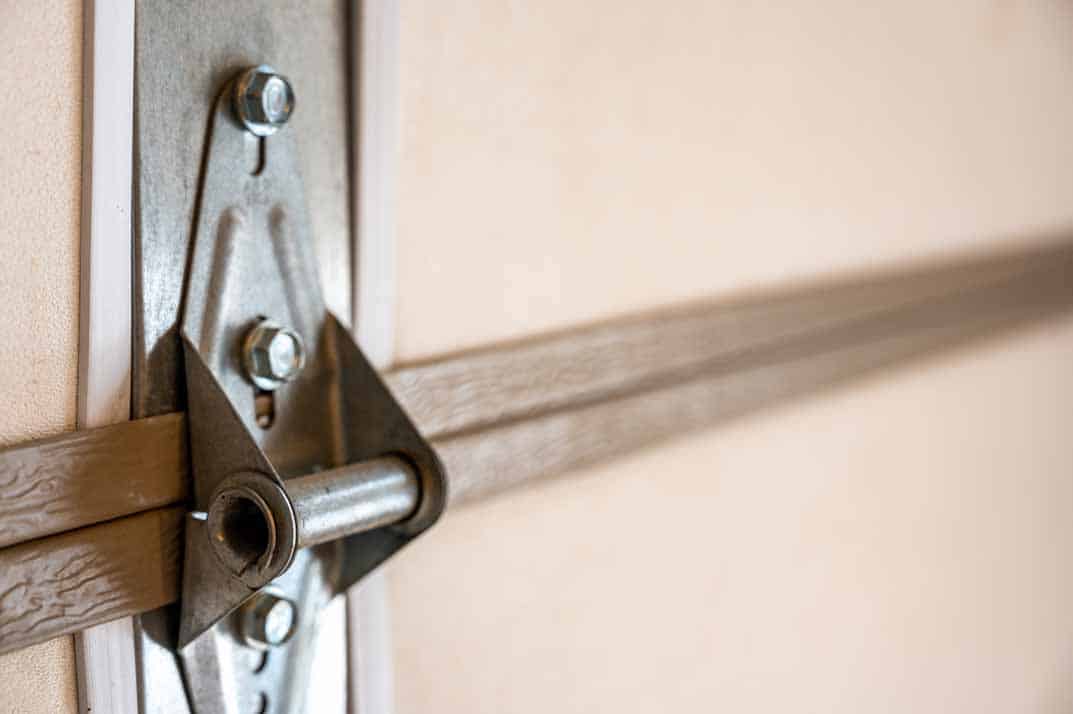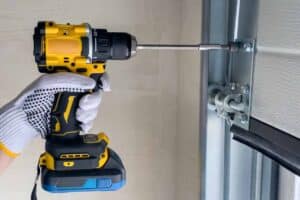Topics Covered:
When most homeowners think about their garage door, hinges are usually an afterthought—if they’re thought of at all. Yet the right hinge type can make all the difference in durability, noise reduction, and overall door performance.
In this detailed guide, we’ll break down the various types of garage door hinges, exploring their specific roles, benefits, and ideal use cases. If you’re in the market for new hinges—whether for a simple repair or a full door overhaul—this is your go-to resource.
1. Standard Residential Hinges
Let’s start with the bread and butter of garage door hardware: standard residential hinges. Often made of galvanized steel, they come in a basic inverted “T” shape and are designed to fit most traditional sectional doors.
Key Features:
- Relatively lightweight yet durable
- Compatible with a wide range of door panel sizes
- Easy to install and replace
These hinges are the go-to option for most residential garage doors under normal usage conditions. They strike a good balance between cost and functionality.
2. Double-End Hinges
Double-end hinges are typically placed near the ends of each door panel—hence the name. They are wider and often come with two sets of holes, allowing them to handle more load.
Best For:
- Heavier doors
- High-traffic garages that see frequent open-and-close cycles
By distributing stress more evenly, double-end hinges help prevent panel damage. If you notice the edges of your garage door panels wearing out, upgrading to double-end hinges may extend the door’s lifespan.
3. Specialty Carriage House Hinges
Carriage house doors feature a distinctive, rustic look reminiscent of traditional stable or barn doors. Their hinges are often larger and more decorative, sometimes featuring ornate designs or black powder-coated finishes to match the door’s aesthetics.
Advantages:
- Adds to the door’s vintage or high-end look
- Designed to handle heavier wood or faux-wood panels
However, these hinges can be pricier and may require specialized installation. If you’re going for a carriage-house style, be prepared to invest a bit more for hinges that are both functional and visually appealing.
4. Commercial-Grade Hinges
Commercial settings—think warehouses, fire stations, or auto mechanic shops—often use larger, heavier doors that see constant operation. Commercial-grade hinges are built with thicker steel and sometimes incorporate ball bearings for smoother movement under high stress.
Key Benefits:
- Superior load capacity
- Durability for high-cycle environments
- Resistance to bending and corrosion
If you have a residential door that’s unusually large or you anticipate very high usage, commercial-grade hinges can be an overkill solution, but they’ll certainly stand the test of time.
5. Heavy-Duty Hinges with Reinforcement Brackets
Some manufacturers offer heavy-duty hinges that come with built-in reinforcement brackets for additional support. These are often used on oversized or insulated doors where extra stability is needed.
Why Choose Them?
- Preemptive reinforcement against bending and warping
- Enhanced rust protection, thanks to thicker metal or special coatings
While more expensive, heavy-duty hinges can save money in the long run by reducing the frequency of hinge replacements for robust doors.
6. Understanding Hinge Numbers (H1, H2, H3, etc.)
You might see part numbers like “H1,” “H2,” or “H3” stamped on your existing hinges. These numbers indicate the hinge’s placement on the door:
- H1: Typically the lowest hinge on each panel, near the floor.
- H2, H3, etc.: Progressively placed higher up the door.
Why does this matter? Each hinge location handles a slightly different load and angle. Using the correct hinge number in the correct spot ensures the door’s balance and smooth operation.
7. Materials and Finishes
Regardless of hinge style, material quality is crucial. Common finishes include:
- Galvanized Steel: Offers rust resistance and an affordable price.
- Stainless Steel: Highly resistant to corrosion but more expensive.
- Powder-Coated: Adds a decorative finish and extra layer of protection.
- Brass or Bronze: Used mostly for decorative or specialty doors; less common in standard residential setups.
Choose the finish based on your local climate (coastal vs. inland), desired aesthetic, and budget constraints.
8. Factors to Consider When Choosing a Hinge Type
To pick the perfect hinge for your door, think about:
- Door Weight: Heavier doors or solid wood panels need robust hinges.
- Usage Frequency: If your garage door is a primary entrance, expect more wear and tear.
- Climate: Humidity and salt air accelerate corrosion; choose corrosion-resistant finishes.
- Style and Aesthetics: For carriage-house or custom doors, decorative hinges might be worth the splurge.
- Budget: You can find standard hinges at relatively low cost, while heavy-duty or decorative versions cost more but may offer greater longevity.
Discussing these factors with a professional can help you zero in on the hinge type that makes the most sense for your situation.
9. Installation and Maintenance Tips
No matter which hinge style you choose, proper installation is key to reaping the full benefits. Here’s how to ensure success:
- Pre-Check the Door Alignment: Install hinges on a door that’s properly balanced and aligned. Otherwise, you may mask bigger issues.
- Use Correct Fasteners: Bolts or screws should match the hinge’s hole size and be rated for the door’s weight. Don’t mix metals that can corrode each other.
- Follow the Numbering System: If your door calls for different hinge numbers at various levels, stick to the manufacturer’s specs.
- Regular Lubrication: Even the most robust hinges benefit from a bit of garage-door-safe lube every few months.
If installing hinges feels daunting, it might be safer to let professionals handle the job. One misaligned hinge can cause problems for the entire door.
10. Cost vs. Longevity
Why spend extra on heavy-duty or decorative hinges when standard ones are cheaper? The answer lies in longevity and performance:
- Fewer Replacements: A high-grade hinge might last twice as long as a budget one, offsetting the higher upfront cost.
- Reduced Door Damage: Stronger hinges can prevent panel warping or track misalignment.
- Aesthetics: Custom or premium hinges can significantly enhance curb appeal, potentially boosting resale value.
Think about your home’s long-term needs. If you’re planning to stay put for years, investing in quality hinges can be a wise decision. If you’re flipping a home or moving soon, standard hinges might suffice.
11. Upgrading Existing Hinges
If you already have a garage door and want to upgrade its hinges, here’s what you need to know:
- Check Compatibility: Measure the existing hinge dimensions, hole patterns, and confirm the new hinges align with your panel spacing.
- Secure the Door: Always brace or secure panels before removing old hinges to prevent shifting or falling.
- Replace in Sequence: Swap hinges one at a time to maintain structural integrity, unless you have professional help and can do multiple simultaneously.
While you can do a piecemeal replacement, if multiple hinges are worn or if your door is older, it may be more efficient to replace them all at once.
12. Professional Guidance from RJ Garage Door Services
Still not sure which hinge type suits you best? At RJ Garage Door Services, we’ve worked with everything from standard residential setups to custom carriage-house projects and heavy-duty commercial doors. We consider factors like:
- Budget constraints
- Style preferences (modern, traditional, carriage-house)
- Frequency of use and environmental conditions
Our team can recommend hinges that align with your specific needs, ensuring you don’t overspend but also don’t compromise on performance or safety. We also handle the entire installation process, from removing old hardware to fine-tuning the door’s alignment.
Final Thoughts
Garage door hinges may seem like a small detail, but they have an outsized impact on how well your door operates and how long it lasts. From simple residential hinges to specialized, decorative, or heavy-duty options, there’s a hinge type for every situation and style preference.
By understanding your door’s weight, usage patterns, and environmental challenges, you can make an informed choice. Whether you opt for standard galvanized steel hinges or spring for a high-end decorative set, the right hinge is the key to smooth, quiet operation and a longer lifespan for your garage door.
We hope this guide clears up the confusion around hinge types and helps you pinpoint the best option for your garage. If you need further guidance or a professional install, RJ Garage Door Services is just a phone call away. Here’s to finding the perfect hinge and enjoying a reliably functional door for years to come!




